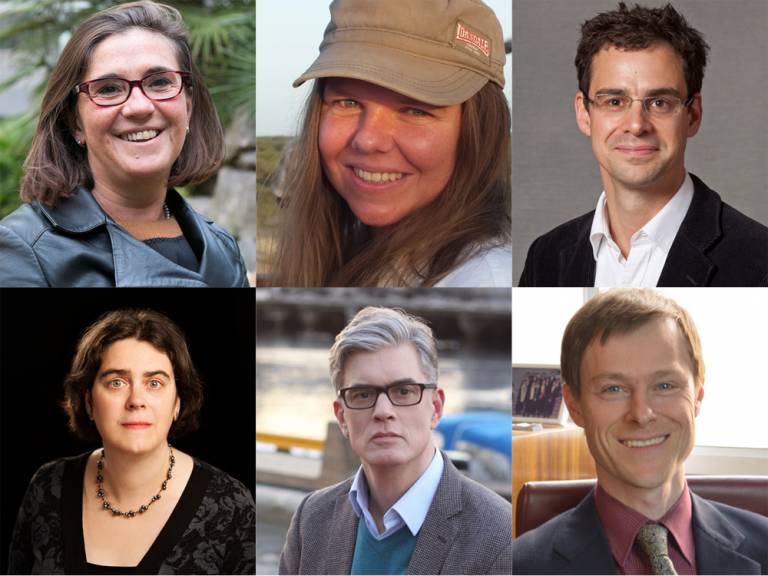Leverhulme Trust recognises UCL research excellence
3 January 2018
The Leverhulme Trust has recognised the excellence of UCL's research, funding a doctoral training programme as well as making 15 awards to academics to further their work in a wide range of fields including the study of the genes in yeast, chemistry and English literature.

Professor Gabriella Vigliocco (UCL Psychology & Language Sciences) received a Leverhulme Doctoral Scholarships award (£1,005,000) from the Leverhulme Doctoral Training Programme for the Ecological Study of the Brain, funding 15 doctoral scholarships over five years.
The study's cross-disciplinary approach will see researchers from Social & Historical Sciences, Brain Sciences, Bartlett School of Architecture, Engineering and the Institute of Education work together to explore the ecological niche in which the brain has evolved.
This is the first time UCL has been awarded Doctoral Training funding from the Leverhulme Trust.
The Trust awarded UCL nine research grants totalling nearly £2 million. Research project grants may be held for up to five years. The maximum grant value is £500,000.
Researchers from UCL Anthropology and UCL Laws received Philip Leverhulme Prizes. The prizes, each worth £100,000, are awarded annually by The Leverhulme Trust across a range of disciplines. They recognise "the achievement of outstanding researchers whose work has already attracted international recognition and whose future career is exceptionally promising". Just 30 researchers from universities across the UK receive the award each year.
The prizes were given to:
Dr Andrea Migliano (UCL Anthropology)
Dr Migliano's academic interests focus on the evolution of human adaptation as well as evolutionary theory as applied to the origins of human diversity, gene-culture co-evolution, as well as adaptations of hunter-gatherers and small scale societies.
Professor Jeff King (UCL Laws)
Professor King's research interests include UK and comparative constitutional and administrative law, human rights (especially social rights), socio-legal studies as well as legal and political theory.
Major Research Fellowships were awarded to:
Professor Alison Shell (UCL English Language & Literature)
Professor Shell's interests include Shakespeare and Renaissance drama; Tudor and Stuart poetry, especially the work of John Donne and Robert Southwell.
Professor Gregory Dart (UCL English Language & Literature)
Professor Dart's research, both current and prospective, is centrally concerned with Romanticism, the City, and the history and development of the essay form from Montaigne to the modern period. At present, as part of his current project 'Charles Lamb and Romanticism', he is editing three volumes of the complete works of Charles and Mary Lamb for Oxford University Press.
The fellowships provide replacement teaching costs over two or three years, to allow academics in the humanities and social sciences to focus on a specific piece of original research.
Professor Marc-Olivier Coppens (UCL Chemical Engineering) received an award to host Visiting Professor Alexander Neimark (Rutgers University) at UCL for six months at UCL's Centre for Nature Inspired Engineering for six months, to work on multiscale molecular simulation of bio-inspired nanomaterials.
"These awards highlight the excellence of UCL researchers across our disciplines. We are grateful for the recognition of the quality of these 15 recipients' work by the Leverhulme Trust, which was fittingly honoured last year as a member of the new UCL Circle of Benefactors, celebrating donors who have given £1m or more to UCL. The trust, and all our other donors, play a key role in supporting leading-edge research at UCL," said Professor David Price, UCL Vice-Provost (Research).
Leverhulme Research Grants were awarded to:
· Professor Wei Li (UCL Institute of Education): Early Childhood Bilingualism: Effect on Brain Structure and Function
· Professor Semi Zeki (UCL Biosciences): Social Influences on Aesthetic Judgments and their Neural Basis
· Dr Michail Stamatakis (UCL Chemical Engineering): From Molecules to Chemical Reactors by Boosting Kinetic Monte-Carlo
· Dr Eleanore Hargeaves (UCL Institute of Education): A Longitudinal Study of Primary Children's Journey to the 'Bottom' of the Class
· Dr Duncan Greig (UCL Genetics, Evolution & Environment): Identification and Analysis of Speciation Genes in Yeast
· Professor David Whitmore (UCL Biosciences): Can individual Cells in Culture Tell the Time of Year?
· Dr Agapi Emmanouilidou (UCL Physics & Astronomy): Exotic Forms of Matter in Molecules Driven by Free-Electron Lasers
· Professor Stephen Price (UCL Chemistry): Radical-Surface Chemistry of Relevance to the Intersteller Medium
· Dr Vijay Chudasama (UCL Chemistry): Understanding How the Microenvironment of a Protein Can Dictate the Course of Bioconjugation
Links
- Professor Gabriella Vigliocco's academic profile
- Dr Andrea Migliano's academic profile
- Professor Jeff King's academic profile
- Professor Alison Shell's academic profile
- Professor Gregory Dart's academic profile
- Professor Marc-Olivier Coppens' academic profile
Image
- Clockwise from top left: Professor Gabriella Vigliocco, Dr Andrea Migliano, Professor Jeff King, Professor Marc-Olivier Coppens, Professor Gregory Dart and Professor Alison Shell.
Contact
Margaret-Anne Orgill
Tel: 020 31083845 Email: m.orgill@ucl.ac.uk
 Close
Close

